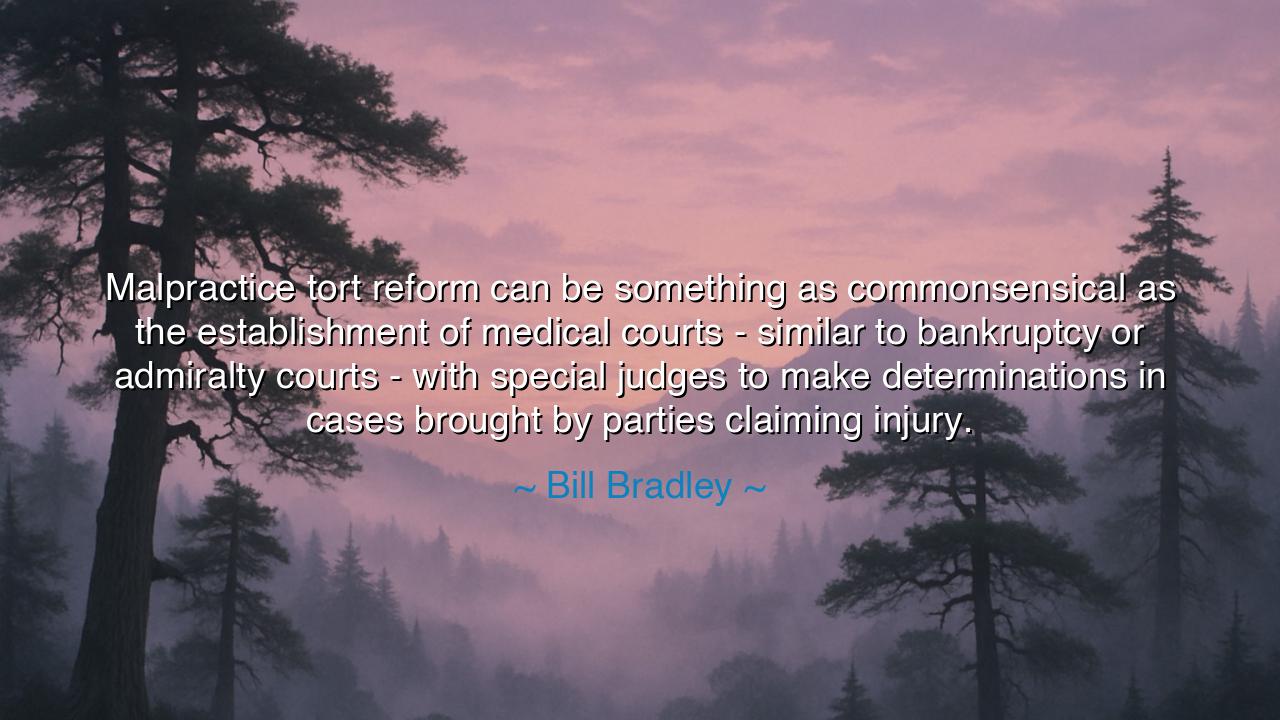
Malpractice tort reform can be something as commonsensical as the
Malpractice tort reform can be something as commonsensical as the establishment of medical courts - similar to bankruptcy or admiralty courts - with special judges to make determinations in cases brought by parties claiming injury.






“Malpractice tort reform can be something as commonsensical as the establishment of medical courts — similar to bankruptcy or admiralty courts — with special judges to make determinations in cases brought by parties claiming injury.”
Thus spoke Bill Bradley, a statesman of reason and reflection, who sought not to abolish justice, but to refine it; not to silence the cry of the injured, but to ensure that truth could be heard clearly, without distortion or delay. His words are not merely a proposal of law, but a meditation on balance — that sacred equilibrium between compassion and fairness, between the rights of the wounded and the duties of those who heal. In them lies the enduring wisdom that every system of justice, like every living body, must evolve to remain whole.
The origin of this quote arises from the turbulent intersection of medicine and law — a place where compassion and conflict often meet. In modern times, medical malpractice has become both a shield for patients and a burden for doctors. Lawsuits, born sometimes of genuine grievance and sometimes of misunderstanding or greed, have driven fear into the hearts of healers. Many physicians, terrified of legal reprisal, practice defensive medicine — ordering unnecessary tests, avoiding high-risk patients, or withdrawing from certain fields altogether. Thus, the very system designed to protect life begins to choke the hands that sustain it. Bradley’s vision, then, is one of restoration: a call to create medical courts, governed not by chance or jury emotion, but by wisdom and specialization.
In ancient times, the sages understood that judgment requires not only law, but understanding. When the Greeks held disputes over navigation or trade, they did not entrust them to ordinary judges, but to the courts of admiralty, where men of the sea — those who knew wind, tide, and the perils of voyage — rendered their decisions. In like manner, Bradley proposes that disputes of medicine be judged by those who know the anatomy of healing, the risks of surgery, and the uncertainty that accompanies human life. For how can a layperson, untrained in the art of medicine, weigh the fine line between mistake and misfortune? The medical court, in his view, would be not a denial of justice, but its refinement — a place where the spirit of equity walks hand in hand with the light of knowledge.
To understand his wisdom, consider the story of Dr. Ignaz Semmelweis, a 19th-century physician who discovered that handwashing could prevent deadly infections among mothers in childbirth. Yet, when he tried to spread his findings, he was mocked, resisted, and driven to ruin. Imagine if his errors — though born of ignorance shared by his time — had been judged by those who understood the context of medical uncertainty, rather than by those quick to condemn. Semmelweis’s life reminds us that medicine is a realm of courage, not perfection; that progress is born of trial, and that judgment without knowledge often destroys the very pioneers it should protect.
Bradley’s call for “commonsensical reform” speaks to this ancient understanding: that law must evolve as knowledge deepens. His suggestion of specialized courts is not the creation of privilege, but the return to principle — that justice, to be just, must be informed. He sees in the existing system a battlefield of confusion, where juries swayed by sympathy or outrage may grant ruinous verdicts without grasping the complexity of the case. The result is a world where both patients and doctors suffer — one denied fair compensation, the other stripped of the courage to serve boldly. The remedy, Bradley argues, lies not in anger, but in wisdom — in courts where truth is judged by those who understand it.
There is, too, a spiritual undercurrent in his words. For what he envisions is not only reform of law, but the restoration of trust between healer and healed. When fear governs medicine, both doctor and patient lose sight of their shared purpose: the preservation of life. A reformed system — one that protects the innocent while holding the negligent accountable — would return medicine to its sacred foundation: compassion untainted by suspicion. Such justice would honor both sides of the healing covenant, ensuring that the pursuit of truth never becomes the persecution of care.
From this reflection arises a lesson for all ages: that wisdom must guide power, and understanding must temper judgment. Whether in law, medicine, or leadership, decisions made without knowledge breed injustice. Each of us, in our own sphere, must strive to see beyond emotion, to judge with empathy informed by learning. In our dealings with others — in our workplaces, our communities, our families — let us seek not the thrill of condemnation, but the grace of comprehension.
And so, let Bill Bradley’s words endure as a call to balance — a reminder that justice and knowledge are the twin pillars of civilization. When the hand of law learns the heart of healing, when judgment is guided by understanding rather than fear, then both doctor and patient, ruler and citizen, shall find peace. For as the ancients taught: the wisest judge is not the one who punishes the fastest, but the one who sees most clearly — and from that clarity, restores harmony to the human order.






AAdministratorAdministrator
Welcome, honored guests. Please leave a comment, we will respond soon